
|
|
The Pirate Radio Hall of Fame needs your
|
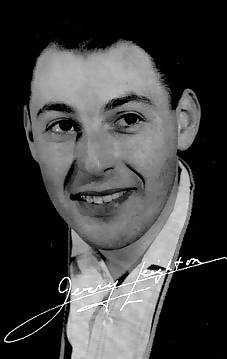 Jerry Leighton Born in London in 1936, Jerry was brought up in Canada before returning to the UK in 1955. He worked as a fashion designer, compère, singer,
comedian and script writer before joining the mv.Fredericia, the original Radio Caroline ship off the Essex coast. When Caroline merged with the rival Radio Atlanta, Jerry stayed on the Fredericia as she sailed
north. Along with Tom Lodge and Alan Turner, the three remained on the air for a unique long-distance broadcast, as the ship travelled to her new anchorage off the Isle Of
Man. Known as Jerry “Soopa” Leighton, he presented The Leighton Early Show on Caroline North and was senior disc-jockey. He used a number of different theme tunes including: Country Line Special by Cyril Davies, Hallelujah Gathering by the Geoff Love Orchestra and Super-Duper Man by Jimmy Cross. For a time in 1965 Jerry left the ship to work in Caroline House,
London. In 1966 The Beatles toured America and three offshore DJs accompanied them to send back reports. Kenny Everett went from Radio London, Ron O'Quinn from
“Swinging” Radio England and Jerry went from Caroline (more details of the Beatles tour here). Jerry Leighton left Caroline when the Marine Offences Act was introduced in 1967. That was
pretty much the end of his broadcasting career although correspondent Philip Champion remembers hearing him on an edition of BBC Radio One's ‘Stage One’ programme in 1969. Jerry dropped from view. He did not keep in
touch with his former colleagues and his whereabouts were something of a mystery until, in early 2014, a production company - with the help of The Pirate Radio Hall of Fame - tracked him down
and interviewed him for an Irish radio documentary about Radio Caroline. The interview, with producer Trevor Dann, is here. Now retired, it
appears that, after his time at sea, Jerry ran an antique shop for a while then worked in casinos for many years. When redundancy brought that to an end he became a cab and limousine driver. (Many thanks to George Morris for
the revised theme tune details. This photo was issued by The Caroline Club. There are more pictures of Jerry in Nick Bailey's, Alan Turner's, Sheridon
Street's and Mick Luvzit's photo albums. We also have some letters Jerry wrote to a listener in the sixties. He attended the Offshore 50 reunion
in August 2017.)
Jerry Leighton Born in London in 1936, Jerry was brought up in Canada before returning to the UK in 1955. He worked as a fashion designer, compère, singer,
comedian and script writer before joining the mv.Fredericia, the original Radio Caroline ship off the Essex coast. When Caroline merged with the rival Radio Atlanta, Jerry stayed on the Fredericia as she sailed
north. Along with Tom Lodge and Alan Turner, the three remained on the air for a unique long-distance broadcast, as the ship travelled to her new anchorage off the Isle Of
Man. Known as Jerry “Soopa” Leighton, he presented The Leighton Early Show on Caroline North and was senior disc-jockey. He used a number of different theme tunes including: Country Line Special by Cyril Davies, Hallelujah Gathering by the Geoff Love Orchestra and Super-Duper Man by Jimmy Cross. For a time in 1965 Jerry left the ship to work in Caroline House,
London. In 1966 The Beatles toured America and three offshore DJs accompanied them to send back reports. Kenny Everett went from Radio London, Ron O'Quinn from
“Swinging” Radio England and Jerry went from Caroline (more details of the Beatles tour here). Jerry Leighton left Caroline when the Marine Offences Act was introduced in 1967. That was
pretty much the end of his broadcasting career although correspondent Philip Champion remembers hearing him on an edition of BBC Radio One's ‘Stage One’ programme in 1969. Jerry dropped from view. He did not keep in
touch with his former colleagues and his whereabouts were something of a mystery until, in early 2014, a production company - with the help of The Pirate Radio Hall of Fame - tracked him down
and interviewed him for an Irish radio documentary about Radio Caroline. The interview, with producer Trevor Dann, is here. Now retired, it
appears that, after his time at sea, Jerry ran an antique shop for a while then worked in casinos for many years. When redundancy brought that to an end he became a cab and limousine driver. (Many thanks to George Morris for
the revised theme tune details. This photo was issued by The Caroline Club. There are more pictures of Jerry in Nick Bailey's, Alan Turner's, Sheridon
Street's and Mick Luvzit's photo albums. We also have some letters Jerry wrote to a listener in the sixties. He attended the Offshore 50 reunion
in August 2017.)
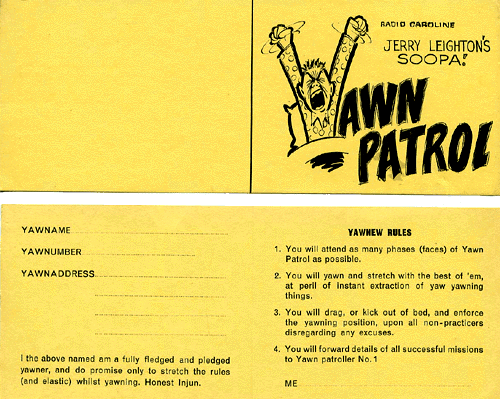
 Mike Lennox Born in Winnipeg, Canada, in 1940, Mike attended college in Texas where he completed a course in “basic radio and television microphone technique”.
At the end of his student days, he returned to Canada and became a DJ on a small local station in Portage La Prairie, Manitoba. From there he moved to a couple of other stations before heading south to Bermuda, where he met up
with Duncan Johnson. Mike came to Britain and worked as a model and acted in various TV and film commercials. He also had a bit-part in the Peter Cushing film Doctor Who and the Daleks. His
old colleague, Duncan, suggested he should join Radio London and, in November 1965, he did. Known as “The Marshall”, he took over the Breakfast Show when Dave Cash moved on. His theme tune
was the Herb Albert's Tijuana Brass version of I'm Getting Sentimental Over You. Mike remained a major member of the Radio
London team up until the end, although for a time he left the ship to work for the station on land. During this period ashore he also found time to appear in another film, playing a disc-jockey in Rita Tushingham's A Smashing
Time. Following the anti-pirate legislation he worked for the BBC and appeared in another British film, The Best House In London, but then moved back to Canada where he dealt in real estate. He later lived in a small
Mexican beach town on the Sea of Cortez. He died of Covid-19 during the coronavirus pandemic in September 2020. Our tribute to him is here. There is a video of Mike broadcasting on Radio London
here and photos of him in Dave Hawkins' and Willy Walker's photo albums and a recent one, taken in Australia by his old Radio London colleague
Norman St.John, here. (This photo from ‘Beat Wave’ magazine.)
Mike Lennox Born in Winnipeg, Canada, in 1940, Mike attended college in Texas where he completed a course in “basic radio and television microphone technique”.
At the end of his student days, he returned to Canada and became a DJ on a small local station in Portage La Prairie, Manitoba. From there he moved to a couple of other stations before heading south to Bermuda, where he met up
with Duncan Johnson. Mike came to Britain and worked as a model and acted in various TV and film commercials. He also had a bit-part in the Peter Cushing film Doctor Who and the Daleks. His
old colleague, Duncan, suggested he should join Radio London and, in November 1965, he did. Known as “The Marshall”, he took over the Breakfast Show when Dave Cash moved on. His theme tune
was the Herb Albert's Tijuana Brass version of I'm Getting Sentimental Over You. Mike remained a major member of the Radio
London team up until the end, although for a time he left the ship to work for the station on land. During this period ashore he also found time to appear in another film, playing a disc-jockey in Rita Tushingham's A Smashing
Time. Following the anti-pirate legislation he worked for the BBC and appeared in another British film, The Best House In London, but then moved back to Canada where he dealt in real estate. He later lived in a small
Mexican beach town on the Sea of Cortez. He died of Covid-19 during the coronavirus pandemic in September 2020. Our tribute to him is here. There is a video of Mike broadcasting on Radio London
here and photos of him in Dave Hawkins' and Willy Walker's photo albums and a recent one, taken in Australia by his old Radio London colleague
Norman St.John, here. (This photo from ‘Beat Wave’ magazine.)

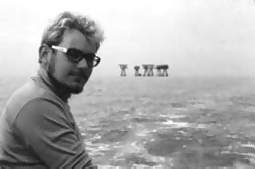 Bob Le Roi first got involved with offshore radio while still at school. Radio City's station manager Eric K Martin asked him to help out by making “tender tapes”.
These were pre-recorded programmes which were played on air while the supply tender was visiting the station. Everybody was needed to help unload the boat and haul everything up the tower so the DJ had to abandon his live programme
and play a tape instead. In March 1965 Bob was invited out to the Radio City fort to present his first live shows. Aged 15, he was the youngest DJ on offshore radio at the time. His first theme tune was by Valerie Mountain & The
Eagles from their Some People EP, later replaced by the George Martin Orchestra's All Quiet on the Mersey Front. During the seventies Bob provided some taped
programmes for Radio Caroline. He has since been heard on BBC local radio and a number of commercial stations, including Invicta Radio, Southern Radio, Channel Travel Radio and Medway FM, where he was also Programme Director. He
has taken part in some of the Radio London restricted service re-creations and similar ones for Radio Northsea. He has also been heard on a daily programme in Malta on Calypso FM. In May 2004 Bob organised a reunion to mark the
fortieth anniversary of Radio Sutch and Radio City. For many years he ran a website which contained some wonderful photos and items of memorabilia from the fort-based offshore stations. At the end of 2023 he was forced to close it
following a cyber attack but his archive is now available on-line again under the name Red Sands Radio. He can currently be heard on a syndicated
programme, Bob's 60's Splash, which is broadcast by a number of radio stations in the UK, Europe and worldwide. (Many thanks to Bob for the information, the photo and the recording.)
Bob Le Roi first got involved with offshore radio while still at school. Radio City's station manager Eric K Martin asked him to help out by making “tender tapes”.
These were pre-recorded programmes which were played on air while the supply tender was visiting the station. Everybody was needed to help unload the boat and haul everything up the tower so the DJ had to abandon his live programme
and play a tape instead. In March 1965 Bob was invited out to the Radio City fort to present his first live shows. Aged 15, he was the youngest DJ on offshore radio at the time. His first theme tune was by Valerie Mountain & The
Eagles from their Some People EP, later replaced by the George Martin Orchestra's All Quiet on the Mersey Front. During the seventies Bob provided some taped
programmes for Radio Caroline. He has since been heard on BBC local radio and a number of commercial stations, including Invicta Radio, Southern Radio, Channel Travel Radio and Medway FM, where he was also Programme Director. He
has taken part in some of the Radio London restricted service re-creations and similar ones for Radio Northsea. He has also been heard on a daily programme in Malta on Calypso FM. In May 2004 Bob organised a reunion to mark the
fortieth anniversary of Radio Sutch and Radio City. For many years he ran a website which contained some wonderful photos and items of memorabilia from the fort-based offshore stations. At the end of 2023 he was forced to close it
following a cyber attack but his archive is now available on-line again under the name Red Sands Radio. He can currently be heard on a syndicated
programme, Bob's 60's Splash, which is broadcast by a number of radio stations in the UK, Europe and worldwide. (Many thanks to Bob for the information, the photo and the recording.)
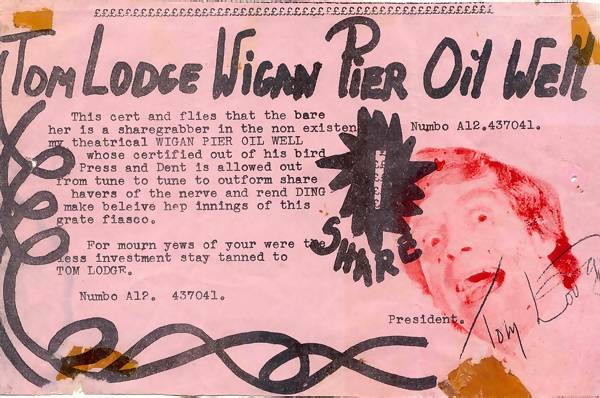
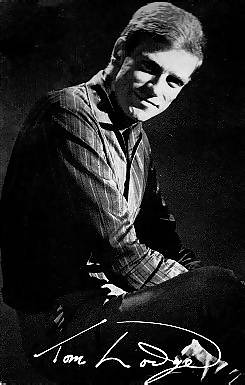 Tom Lodge was destined to work in broadcasting. His grand-father, Sir Oliver Lodge, was one of the pioneers of wireless telegraphy. Tom was born in Forest Green, Surrey, in
1936 but his family moved to America when he was four. He came back to the UK for his schooling but, on his 18th birthday, sailed to Canada where he worked as a cowboy. He spent two years on an expedition into the frozen wastes of
the Canadian Arctic, an experience he later wrote about in his book Beyond the Great Slave Lake. He joined CBC, the Canadian
state broadcaster, and after working for them in Canada was posted to London. A chance meeting with Radio Caroline's founder Ronan O'Rahilly in a pub led to Tom joining the new station off the coast of East
Anglia in 1964, just after the first broadcast. When the ship sailed to the Isle Of Man to become Radio Caroline North, it was Jerry Leighton, Alan Turner and Tom who kept
broadcasting during the journey. (There is more about this voyage, including audio clips, here.) Tom stayed on the North ship through most of 1965 but transferred to the South ship when Ronan O'Rahilly bought
out his partner towards the end of the year. He was aboard the south ship, the mv.Mi Amigo, on the night in January 1966 when she lost her anchor and was washed up on the beach. He presented the Breakfast Show on both ships
and was senior DJ / Programme Controller. He had a number of different theme tunes: The Preacher by Billy May then two different versions of the same tune,
Rinky Dink by the Johnny Howard Band and Sounds Incorporated, as well as the latter group's I'm Coming Through. After leaving Caroline Tom worked briefly for the BBC (a series called Radio One O'Clock in early 1968) before returning to Canada where he worked in radio for a time, became Head of Communications at
the University of Ontario, farmed jojoba nuts in Costa Rica, wrote a second book Success Without Goals, set up the International Breatherapy Association, managed his son's pop group, The Corndogs, and worked with a Californian
project called Radio One Earth. In 1995 he moved back to the UK and was heard on Caroline's low powered “restricted service” broadcasts in Clacton, London and Kent. Tom returned to America where he operated the Stillpoint
Zen Community in Santa Cruz, California. He wrote a book about his time at sea, part of which he allowed us to include on The Pirate Radio Hall Of Fame. See The Ship That Rocked
the World: The Radio Caroline Story. Tom was interviewed over the phone on the Radio Caroline satellite service on Easter Sunday 2004. He discussed his time on the ships, his memories of the station and his book. The interview was
so well received that he was asked to provide regular programmes. He did this with the help of his son Tom Lodge Junior but bowed out at Easter 2007. At the end of 2011 Tom posted on Facebook that he was suffering from cancer. He kept
friends, former colleagues and listeners updated on the illness but died on 25th March 2012, aged 75. Our tribute to this giant of offshore radio is here. (This photo was issued by The Caroline Club. Tom
features in some pictures in Keith Hampshire's photo album and very kindly provided some fantastic photographs and items of memorabilia from his own collection. See Tom Lodge's photo
album.)
Tom Lodge was destined to work in broadcasting. His grand-father, Sir Oliver Lodge, was one of the pioneers of wireless telegraphy. Tom was born in Forest Green, Surrey, in
1936 but his family moved to America when he was four. He came back to the UK for his schooling but, on his 18th birthday, sailed to Canada where he worked as a cowboy. He spent two years on an expedition into the frozen wastes of
the Canadian Arctic, an experience he later wrote about in his book Beyond the Great Slave Lake. He joined CBC, the Canadian
state broadcaster, and after working for them in Canada was posted to London. A chance meeting with Radio Caroline's founder Ronan O'Rahilly in a pub led to Tom joining the new station off the coast of East
Anglia in 1964, just after the first broadcast. When the ship sailed to the Isle Of Man to become Radio Caroline North, it was Jerry Leighton, Alan Turner and Tom who kept
broadcasting during the journey. (There is more about this voyage, including audio clips, here.) Tom stayed on the North ship through most of 1965 but transferred to the South ship when Ronan O'Rahilly bought
out his partner towards the end of the year. He was aboard the south ship, the mv.Mi Amigo, on the night in January 1966 when she lost her anchor and was washed up on the beach. He presented the Breakfast Show on both ships
and was senior DJ / Programme Controller. He had a number of different theme tunes: The Preacher by Billy May then two different versions of the same tune,
Rinky Dink by the Johnny Howard Band and Sounds Incorporated, as well as the latter group's I'm Coming Through. After leaving Caroline Tom worked briefly for the BBC (a series called Radio One O'Clock in early 1968) before returning to Canada where he worked in radio for a time, became Head of Communications at
the University of Ontario, farmed jojoba nuts in Costa Rica, wrote a second book Success Without Goals, set up the International Breatherapy Association, managed his son's pop group, The Corndogs, and worked with a Californian
project called Radio One Earth. In 1995 he moved back to the UK and was heard on Caroline's low powered “restricted service” broadcasts in Clacton, London and Kent. Tom returned to America where he operated the Stillpoint
Zen Community in Santa Cruz, California. He wrote a book about his time at sea, part of which he allowed us to include on The Pirate Radio Hall Of Fame. See The Ship That Rocked
the World: The Radio Caroline Story. Tom was interviewed over the phone on the Radio Caroline satellite service on Easter Sunday 2004. He discussed his time on the ships, his memories of the station and his book. The interview was
so well received that he was asked to provide regular programmes. He did this with the help of his son Tom Lodge Junior but bowed out at Easter 2007. At the end of 2011 Tom posted on Facebook that he was suffering from cancer. He kept
friends, former colleagues and listeners updated on the illness but died on 25th March 2012, aged 75. Our tribute to this giant of offshore radio is here. (This photo was issued by The Caroline Club. Tom
features in some pictures in Keith Hampshire's photo album and very kindly provided some fantastic photographs and items of memorabilia from his own collection. See Tom Lodge's photo
album.)
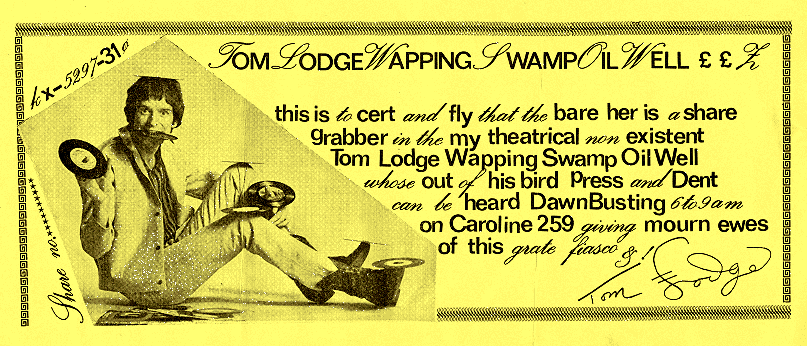
Graham London Radio Tower was one of the less successful offshore radio ventures of the sixties. Based on Sunk Head anti-aircraft fort, about ten miles off Walton on the Naze in Essex, it operated intermittently during the last few months of 1965 and first few of 1966 but never really got beyond the test transmission stage. Graham London was one of the presenters and, in November 2010, he contacted The Pirate Radio Hall of Fame. He says that after his brief career in broadcasting, he joined the Parachute Regiment, followed by the French Foreign Legion. He is now back working offshore again, this time as a diver in the oil industry, based in Aberdeen. He says he had a great time on the tower but it was “a little primitive”. Asked for any memories of life aboard Sunk Head, he replied that the main one was of “perpetual dampness”! (Our thanks to Graham for getting in touch.)
 Adrian Love Born in York on 3rd August 1944, Adrian was the son of band leader Geoff Love. After finishing his education his first job was working in a tailor's shop but he
did not stay long. He then joined the music business, dealing with artist management and music publishing. He also played bass in various jazz bands and a symphony orchestra before applying for a job with Radio City in 1966. Despite
his lack of broadcasting experience, the station gave him a chance and Adrian ended up presenting the Breakfast Show from the “tower of power.” When City closed down he moved to the BBC Light Programme, then the World
Service and, for a while, ran the United Biscuits Network, a factory radio station which employed a number of former pirate DJs. London's LBC launched in 1973 and, shortly afterwards, Adrian joined to present a phone-in show. From
there he moved to Capital Radio. He was later heard on BBC Radios One and Two, British Forces Broadcasting, County Sound, Jazz FM, Classic FM and BBC Southern Counties Radio. In 1998 he was involved in a serious car accident and,
although he survived the crash, his health was never the same again and he died in March 1999. There is an obituary on the BBC website. In 2007 he
was inducted into the Radio Academy Hall of Fame. (Thanks to James Pringle for some of the information above. This photo was taken by Bill Price and kindly
provided by Jan Hill. More of Bill's photos are here.)
Adrian Love Born in York on 3rd August 1944, Adrian was the son of band leader Geoff Love. After finishing his education his first job was working in a tailor's shop but he
did not stay long. He then joined the music business, dealing with artist management and music publishing. He also played bass in various jazz bands and a symphony orchestra before applying for a job with Radio City in 1966. Despite
his lack of broadcasting experience, the station gave him a chance and Adrian ended up presenting the Breakfast Show from the “tower of power.” When City closed down he moved to the BBC Light Programme, then the World
Service and, for a while, ran the United Biscuits Network, a factory radio station which employed a number of former pirate DJs. London's LBC launched in 1973 and, shortly afterwards, Adrian joined to present a phone-in show. From
there he moved to Capital Radio. He was later heard on BBC Radios One and Two, British Forces Broadcasting, County Sound, Jazz FM, Classic FM and BBC Southern Counties Radio. In 1998 he was involved in a serious car accident and,
although he survived the crash, his health was never the same again and he died in March 1999. There is an obituary on the BBC website. In 2007 he
was inducted into the Radio Academy Hall of Fame. (Thanks to James Pringle for some of the information above. This photo was taken by Bill Price and kindly
provided by Jan Hill. More of Bill's photos are here.)
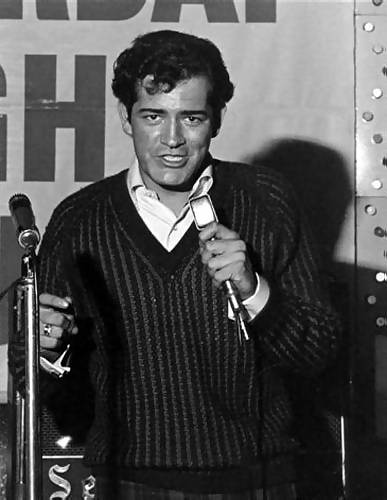 Mick Luvzit Born on 24th February 1944, according to his official Radio Caroline biography, in Portage la Prairie, Manitoba, Canada, Mick was a talented musician, winning a
violin competition at the age of 14. He worked for a number of Canadian radio stations, including CKY, CHWO, CHIC, CHUM and CFGM before heading for the UK. He initially joined Caroline South in June 1966 before moving to the North
ship. He was welcomed by the listeners and received over a thousand fan letters in his first week on air. His theme was Tune Up by Junior Walker & the All-Stars. In
1966 Mick released a single on the Decca label A Long Time Between Lovers. While working on Caroline North Mick met Janet, the sister of a fellow Caroline DJ “Ugli” Ray Teret. They
began dating and there was talk of marriage. Someone (possibly Tony Prince, possibly Mick himself) suggested that they should capitalise on the romantic idea of being married at sea by a ship's captain
and tie the knot on board the mv.Fredericia. The wedding took place on 20th September 1966, performed by the Caroline captain Martin Gips and with a
commentary on Caroline North from news-chief Graham Webb. (For more about the wedding, see this article, Mick's photo album and this
video.) Sadly the marriage was not to last and they divorced during the seventies. Steve Young updated us in 2000: “Mick Luvzit is living in Vancouver. He broadcasts for a
Christian radio station located just across the border in Washington State. They built a studio for him in his home and he works from there.” In February 2001 Mick himself contacted The Pirate Radio Hall
of Fame to say: “I'm busy putting together my studio here in my home so I can do some radio shows for the UK and Ireland.” In December 2001 the first of these took place when Mick guested on Kenny Tosh's
programme on Belfast's CityBeat FM. This was followed by a live show on CityBeat in August 2002 when Mick was visiting the UK for a DJ reunion. There are pictures of the reunion on the
Radio London website. Mick also helped to organise another DJ reunion in Vancouver in July 2004. There
are photos here. In November 2010 we heard from Mick again. He told us he had been busy writing a script for a documentary on addiction to alcohol and drugs. Sadly Mick died on 8th December 2012. At the time
of his death he was said to be 70 which casts doubt on the birthdate above. We think the Caroline Press Office probably knocked a couple of years off his age and he was actually born on 24th February 1942. Our tribute to Mick is
here. (The photo, above, shows Mick singing his song ‘Long Time Between Lovers’ at a Caroline Night Out at the Wimbledon Palais in 1966. Many thanks to him for supplying it.)
Mick Luvzit Born on 24th February 1944, according to his official Radio Caroline biography, in Portage la Prairie, Manitoba, Canada, Mick was a talented musician, winning a
violin competition at the age of 14. He worked for a number of Canadian radio stations, including CKY, CHWO, CHIC, CHUM and CFGM before heading for the UK. He initially joined Caroline South in June 1966 before moving to the North
ship. He was welcomed by the listeners and received over a thousand fan letters in his first week on air. His theme was Tune Up by Junior Walker & the All-Stars. In
1966 Mick released a single on the Decca label A Long Time Between Lovers. While working on Caroline North Mick met Janet, the sister of a fellow Caroline DJ “Ugli” Ray Teret. They
began dating and there was talk of marriage. Someone (possibly Tony Prince, possibly Mick himself) suggested that they should capitalise on the romantic idea of being married at sea by a ship's captain
and tie the knot on board the mv.Fredericia. The wedding took place on 20th September 1966, performed by the Caroline captain Martin Gips and with a
commentary on Caroline North from news-chief Graham Webb. (For more about the wedding, see this article, Mick's photo album and this
video.) Sadly the marriage was not to last and they divorced during the seventies. Steve Young updated us in 2000: “Mick Luvzit is living in Vancouver. He broadcasts for a
Christian radio station located just across the border in Washington State. They built a studio for him in his home and he works from there.” In February 2001 Mick himself contacted The Pirate Radio Hall
of Fame to say: “I'm busy putting together my studio here in my home so I can do some radio shows for the UK and Ireland.” In December 2001 the first of these took place when Mick guested on Kenny Tosh's
programme on Belfast's CityBeat FM. This was followed by a live show on CityBeat in August 2002 when Mick was visiting the UK for a DJ reunion. There are pictures of the reunion on the
Radio London website. Mick also helped to organise another DJ reunion in Vancouver in July 2004. There
are photos here. In November 2010 we heard from Mick again. He told us he had been busy writing a script for a documentary on addiction to alcohol and drugs. Sadly Mick died on 8th December 2012. At the time
of his death he was said to be 70 which casts doubt on the birthdate above. We think the Caroline Press Office probably knocked a couple of years off his age and he was actually born on 24th February 1942. Our tribute to Mick is
here. (The photo, above, shows Mick singing his song ‘Long Time Between Lovers’ at a Caroline Night Out at the Wimbledon Palais in 1966. Many thanks to him for supplying it.)
